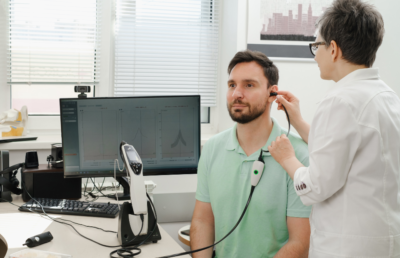We all have responsibilities throughout the day that can be exhausting and can make us feel like taking a nap. But for those with hearing loss, day-to-day activities can be even more tiring than they would be for those with healthy hearing. This is due to a condition called listening fatigue.
What is Listening Fatigue?
For those with healthy hearing, listening, and understanding what’s being said comes as naturally as breathing or blinking. However, for those with hearing loss, the opposite is true. With hearing loss, the brain has to work harder to make sense of the information that it receives. This means that the brain compensates for the loss in hearing, which can be mentally exhausting.
A more detailed explanation is as follows: there are tiny sensory hair cells in our inner ear that are responsible for translating the noise the outer ear gathers into electrical signals, which they send along the auditory nerve to the brain. Each hair cell is responsible for translating a specific pitch or frequency. When these hair cells die or get damaged, the auditory system loses the ability to translate that frequency, forcing the brain to work harder. Therefore, when a person with hearing loss pays attention to and comprehends speech for a longer period of time, they get more tired than a person with healthy hearing.
For a short and simple demonstration, read this sentence: “Wht des ths sntnc sy?” Even though it’s possible to figure out that it says: “What does this sentence say?”, filling in the blanks takes a bit more time and effort than reading the sentence normally. Imagine how much effort it would take to read this article if all of it was written like this. This is similar to what people with hearing loss experience from listening fatigue. This extra work the brain has to do can be mentally exhausting.
How to cope with listening fatigue?
Unfortunately, damage to the fragile sensory cells needed for healthy hearing is irreversible, but there are ways to make your daily activities easier to manage.
Amplification and Hearing Devices
The biggest thing that can be done to reduce listening fatigue, if you have hearing loss, is to get properly fit amplification and wearing them. Depending on the degree of hearing loss, hearing aids and cochlear implants can improve hearing and speech comprehension, decreasing the strain on the brain and reducing the chance of listening fatigue setting in. Many patients report not feeling so tired after getting hearing aids. If you’re experiencing hearing loss or listening fatigue, consult an audiologist who can identify, diagnose, and provide treatment options tailored to your needs.
Let your brain take a break
If you don’t wear hearing aids, consider giving yourself a break away from noise and sounds. Take a walk outside or along a quiet street or find somewhere tranquil to close your eyes and relax for a few minutes.
Practice breathing exercises
Whenever feeling overwhelmed or tired of listening and understanding for a longer period of time, take some deep breaths to clear your mind and reduce stress and blood pressure. This will help your body and mind calm down and take a short break.
Reduce background noise
People with hearing loss often find it difficult to distinguish speech from background noise. The less background noise your ears and brain have to process, the less energy it takes to comprehend speech. Whenever you have to listen and pay attention to something, try to eliminate as much background noise as you can.
Take a nap
While this may not always be a plausible option, if your day allows it, take a nap to let your body and mind relax. According to the National Sleep Foundation, a 20–30-minute nap can improve your performance without leaving you even more tired or interfering with your night-time sleep.
Besides causing listening fatigue, untreated hearing loss can worsen and can sometimes have serious consequences like putting you at risk for developing depression or experiencing social isolation or anxiety. It may also place a burden on people around you.
If you’re not hearing well or are experiencing listening fatigue, it’s time to get your hearing evaluated by a professional audiologist, who can help you find a solution tailored to your needs. Fill in this short form to book an appointment for a hearing test!




